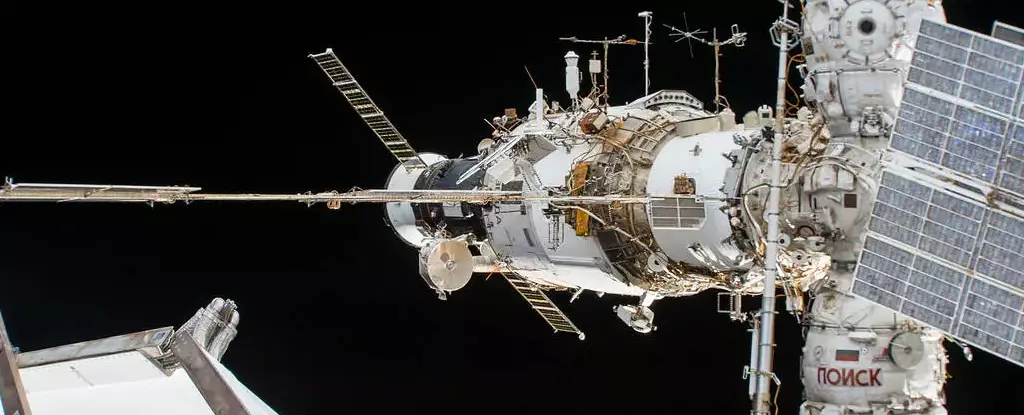The Russian segment of the International Space Station (ISS) experienced yet another coolant leak, marking the third incident in under a year. This latest development has raised concerns about the reliability of Russia’s space program. While officials have assured that the crew members are not in immediate danger, the occurrence of multiple leaks is alarming and begs the question of whether the country’s space systems can be trusted.
Flakes of frozen coolant were observed spraying into space, as captured in the live feed provided by NASA. The Russian space agency, Roscosmos, confirmed this coolant leak from the external radiator circuit of the Nauka module, which was delivered to the ISS in 2012. However, Roscosmos maintained that temperatures in the affected unit remained stable, emphasizing that there was no immediate threat to the crew or the station itself.
Upon discovering the flakes, US mission control in Houston promptly requested American astronauts to investigate the situation. NASA astronaut Jasmin Moghbeli confirmed that a leak was indeed coming from the radiator of the Multipurpose Laboratory Module-Upgrade (MLM), also known as Nauka. Authorities later affirmed that the primary radiator on Nauka was functioning normally and providing adequate cooling to the module without any adverse effects on the crew or station operations.
This coolant leak is not an isolated incident but the third of its kind within a year. In December 2022, dramatic images broadcasted by NASA TV revealed particles resembling snowflakes pouring out of a docked Soyuz MS-22 spacecraft. Speculation initially revolved around a possible impact from a micro meteorite, but subsequent investigations discounted this theory. Following this incident, an uncrewed Soyuz was dispatched to replace the affected spacecraft, resulting in a year-long mission for two Russians and an American crew who only returned last month. Moreover, another leak in February affected the Russian Progress MS-21 cargo ship, which had previously been docked to the ISS since October 2022.
The occurrence of three coolant leaks within a relatively short timeframe indicates a systematic issue within Russia’s space systems. Space analyst Jonathan McDowell has stated that “You’ve got three coolant systems leaking – there’s a common thread there. One is whatever, two is a coincidence, three is something systematic.” His observation suggests the possibility of a deeper problem that extends beyond mere chance. McDowell further speculates that a subcontractor company may be responsible for the recurring leaks.
Amy_robothaggis’ has made changes that need to be reviewed.
The Russian space sector, which has historically been the pride of the country, has been facing difficulties for years, between lack of funding, failures and corruption scandals. The ISS is one of the few areas of cooperation still ongoing between Moscow and Washington since the start of the Russian offensive in Ukraine and the international sanctions that followed.
‘
The Russian space sector has endured a series of challenges in recent years, which have contributed to its diminishing reputation. Issues such as inadequate funding, mission failures, and corruption scandals have plagued the industry. Amidst tensions caused by the Russian offensive in Ukraine and resulting international sanctions, the International Space Station has remained one of the few avenues of ongoing cooperation between Moscow and Washington. However, the recurring coolant leaks underscore the deteriorating reliability of Russian space systems, adding to the country’s already tarnished image.
The repeated coolant leaks in the Russian segment of the ISS have highlighted the pressing concerns surrounding the country’s space program. While officials assert that the crew members are not in immediate danger, the frequency of these incidents raises questions about the reliability of Russia’s space systems. With three leaks occurring over a short period, the likelihood of a systematic issue becomes more apparent. As Russia’s once proud space sector grapples with funding shortages and a series of failures, the need for rectification and restoration of trust in their space capabilities becomes increasingly urgent.


Leave a Reply